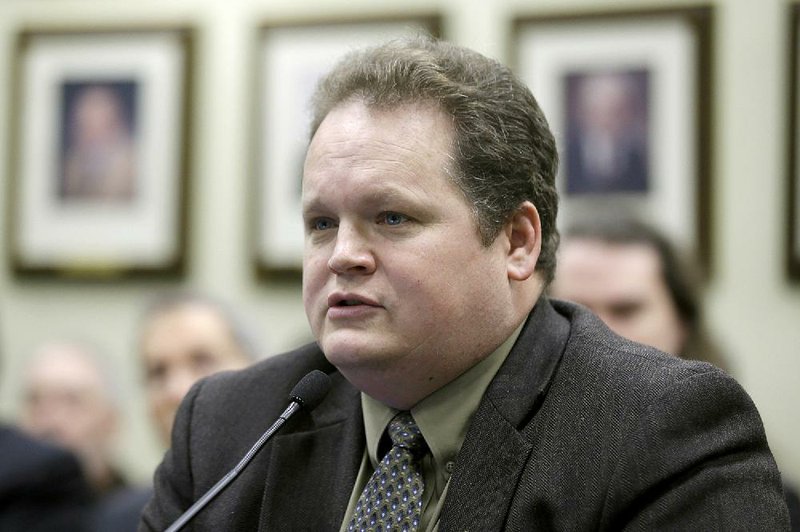CORRECTION: A proposed five-year ban on new medium or large hog farms in the Buffalo River watershed had to be heard before the Arkansas Legislative Council on Friday and receive approval before it could advance to the Arkansas Pollution Control and Ecology Commission for final passage. This article incorrectly stated the process for consideration of the ban.
A proposed five-year ban on new medium and large hog farms in the Buffalo National River watershed cleared its second-to-last hurdle Wednesday morning when it passed through the Arkansas Legislature's Rules and Regulations Committee with only one representative objecting.
A final decision on the ban could come Aug. 28 when the Pollution Control and Ecology Commission -- the Arkansas Department of Environmental Quality's appellate body -- meets.
The commission originally got the rule-making process underway after the Ozark Society and the Arkansas Public Policy Panel submitted a proposal seeking a permanent ban on new medium and large hog farms in the watershed.
"I don't have any reason to believe the commission won't support this at this point," said Sam Ledbetter, an attorney with the McMath Woods firm representing the Ozark Society and the Arkansas Public Policy Panel.
Flanked by former U.S. Reps. Vic Snyder and Ed Bethune of Arkansas, Ledbetter testified in favor of the ban Wednesday.
The five-year ban -- a compromise among environmental representatives, Gov. Asa Hutchinson's office and some state legislators -- requires that, in five years, the Department of Environmental Quality's director initiate a new rule-making process to delete the ban or make it permanent. That step would allow the director, the commission and legislators to review the continuing study by the University of Arkansas System's Agriculture Division on the environmental impact of C&H Hog Farms in Mount Judea in the Buffalo River watershed.
C&H Hog Farms is a large hog facility on Big Creek, six miles from where it meets the Buffalo River. The facility, now 2 years old, has been criticized by environmental groups for its potential to pollute the river with millions of gallons of hog feces kept in lagoons or spread out as fertilizer on the rough karst terrain in the area.
The Buffalo National River -- the county's first national river -- is a popular tourist spot, with more than 1.3 million visitors in 2014 who spent about $56.6 million at area business, according to National Park Service data.
The proposed ban would have no impact on C&H Hog Farms.
Banning medium and large hog farms means no new facility could have more than 750 swine at the 55-pound level nor more than 3,000 swine coming in below the 55-pound level.
Since C&H began operating, the Arkansas Department of Environmental Quality has not received any applications for new medium or large hog farms in the watershed. The agency has been unable to issue such applications since April 2014 because of temporary bans imposed by the Pollution Control and Ecology Commission.
An Arkansas Pork Producers Association official has said no one is interested in a new hog farm in the area because of the uproar about C&H.
Cargill, the supplier or operator of more than 90 percent of pork-production facilities in the state, has self-imposed a ban on new medium or large hog farms in the watershed. Brazil-based JBS recently agreed to purchase the company's pork division.
Rep. Nate Bell, a Mena independent, opposed the rule making.
Bell argued that restricting how landowners can use their property constitutes an "uncompensated taking" in violation of the Arkansas Constitution. Property owners have the right to review and decide what they want to do with their own land, which they couldn't do if they wanted to start medium or large hog farms under the rule, Bell said.
Rep. Jeremy Hutchinson, R-Little Rock, said he's sympathetic regarding property rights, but noted that the Legislature already sets rules that tell people what they can and cannot do with their land, such as prohibiting liquor stores from being within a certain distance of churches. The rule heard Wednesday was no different, he said, arguing that those landowners have "many other uses available to them."
Bell made a motion to oppose the rule, the first such motion that a member of the Rules and Regulations Committee has made since voters passed a state constitutional amendment that required the committee to approve or disapprove new rules proposed by most state agencies.
Previously, state agencies sent rules to be reviewed by committees in a nonbinding fashion.
Committee Chairman Rep. Andy Davis, R-Little Rock, called for a vote on considering Bell's motion. Only Bell voted in favor of it after a short pause.
Snyder and Bethune testified in favor of the rule making.
Bethune and former Rep. John Paul Hammerschmidt, who died earlier this year, had written a letter to state legislators last year urging them to review the permanent ban, which would have sent it back to the Pollution Control and Ecology Commission for final approval.
On Wednesday, Bethune, a Republican who represented Arkansas in the U.S. House of Representatives from 1979 until 1985, asked that legislators consider the value of the Buffalo River and efforts to preserve nature in the state.
"I'm probably the oldest person in this room today -- if not, I'm damn close -- and I remember when we had to struggle as kids to tell what was so good about Arkansas," Bethune said, mentioning the diamonds near Murfreesboro and an alligator farm among the short list of things he used to tell people about.
"And now we have so much to be proud of," he said. "Most noteworthy in that, I think, is the Buffalo National River."
Snyder, who served as a Democrat from Arkansas in the U.S. House of Representatives from 1997 until 2011, said Wednesday that a review would symbolize the committee's wish to "protect this river."
Other legislators said the five-year ban before them Wednesday was a welcome compromise for everyone concerned.
Rep. Kelley Linck, R-Flippin, lamented the approval of C&H Hog Farms but said he thought the compromise would satisfy the concerns of the Legislature's agriculture committees and tourism interests.
"I think this is a good rule," he said, noting that he hoped officials would have a greater consensus at the conclusion of the UA System's Agriculture Division study on the hog farm's environmental impact.
"I think that whatever we do should be science-based and not just a blanket rule," said Sen. Bruce Maloch, D-Magnolia, said as a reflection of his favor for agriculture-related business.
Wednesday was the fourth time that proponents of the ban had gone before a legislative committee but the first before the Rules and Regulations Committee, which had to approve the rule making after the Legislature's Public Health, Welfare and Labor committees reviewed it in July.
The public health and agriculture committees were hesitant to review the rule in 2014, when it was a permanent ban, with some legislators concerned that the ban would put the state on a "slippery slope" of anti-agricultural rules.
But the compromise plan has successfully passed through the public health committees and now Rules and Regulations Committee this year.
"I think this is a good path forward," Arkansas Department of Environmental Quality Director Becky Keogh said after meeting, noting the opportunity to consider the study in five years.
Metro on 08/20/2015


